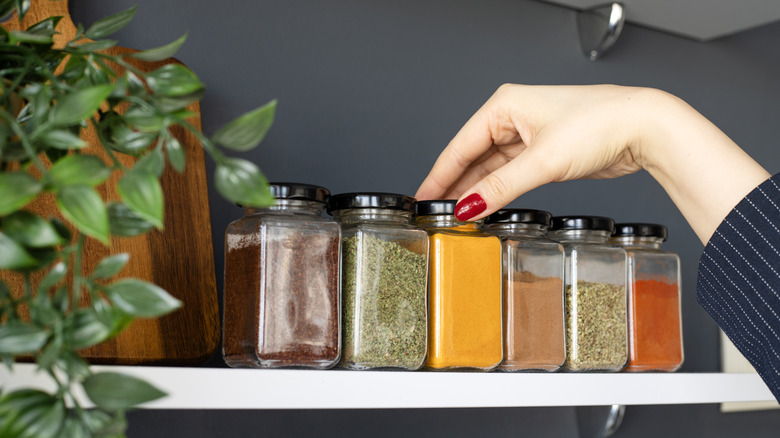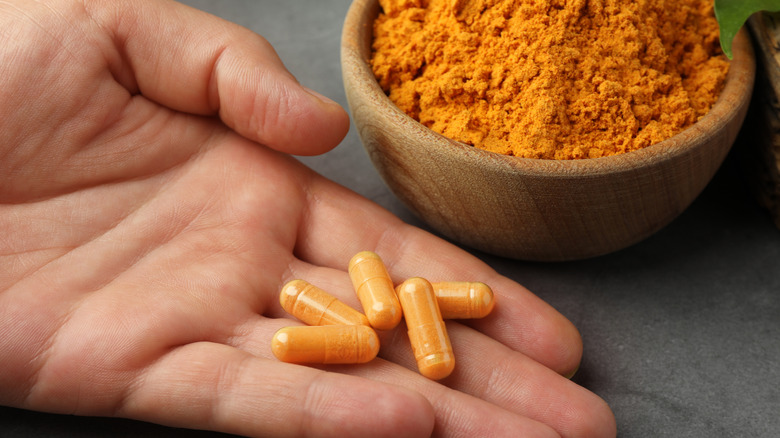
Hazal Ak/Getty Images
Years ago, turmeric may have gathered dust on your spice rack, used only for those special curries and soups. Now, turmeric has found new life as a wellness staple. Long revered in Ayurvedic medicine for its healing properties, turmeric has been used for over 4,000 years to ease ailments like arthritis, digestive troubles, and abdominal pain, according to the book “Herbal Medicine: Biomolecular and Clinical Aspects” (via National Library of Medicine).
Today, you can find ground turmeric in the spice aisle and fresh turmeric root in the grocery aisle. You’ll also find it on your supplement shelves to get more of turmeric’s powerful anti-inflammatory and antioxidant benefits. But while it may be beneficial to take turmeric every day, it’s just as easy to overdo it.
“Too much turmeric can irritate the digestive tract and cause symptoms like nausea, diarrhea, bloating, or even stomach cramps,” said Fitness and Nutrition Advisor at BarBend, Dr. Chris Mohr, in a Health Digest interview. “This mostly happens because curcumin, the active compound in turmeric, can stimulate the gut lining and increase acid production.”
Turmeric’s side effects

Liudmila Chernetska/Getty Images
While you’re unlikely to experience diarrhea or gastrointestinal distress from adding powdered turmeric to your meals or drinking turmeric tea, problems may arise when taking a turmeric extract supplement. “With higher doses, turmeric might also speed up how fast food moves through your digestive system, which can lead to loose stools,” Mohr said. “People with sensitive stomachs or acid reflux might notice these side effects even at lower doses.”
If you juice turmeric root along with other vegetables, your body may not absorb all of turmeric’s beneficial compounds. Turmeric supplements often include piperine (an antioxidant found in black pepper) to enhance absorption. However, these highly bioavailable forms of turmeric can be toxic to the liver in high doses, according to LiverTox (via National Library of Medicine). This toxicity typically doesn’t occur after just one or two doses but may develop over several weeks. Symptoms of liver toxicity from turmeric include fatigue, nausea, and dark urine.
People with gastroesophageal reflux disease (GERD), gallbladder issues, liver disease, or iron deficiencies should use turmeric supplements with caution. Turmeric should also be avoided if you’re taking injectable blood thinners. “It’s always wise to follow the directions and remember that more isn’t better,” Mohr said. “And similarly, check with your own health care provider to make sure there’s no concern about interactions with other medications you may be taking.”
Some benefits of turmeric

Rawlstock/Getty Images
Researchers have tested the effectiveness of turmeric and its curcuminoids on arthritis pain. A 2020 review in Nutrition Today examined 20 clinical trials and found that turmeric or its compounds helped relieve stiffness and walking pain similarly to over-the-counter pain relievers. Some studies also reported that people taking turmeric needed fewer prescription pain medications. However, many of these studies were small or lacked rigorous controls.
The same review also looked at how turmeric may help with conditions such as high blood sugar, high cholesterol, obesity, and type 2 diabetes. Small studies showed that turmeric can reduce blood sugar levels and insulin resistance in people with prediabetes. Individuals with non-alcoholic fatty liver disease may also see improvements in blood sugar and cholesterol after taking turmeric. While turmeric may be used as an adjunct to medication for type 2 diabetes, results have been inconsistent when it’s used on its own.
(Read how turmeric may improve your mental health.)
As you age, you may consider turning to turmeric to support brain blood flow and oxygenation. A 2021 study in the International Journal of Food Sciences and Nutrition found that taking turmeric extract two hours before exercise increased brain oxygenation and blood volume during physical activity. On a related note, turmeric may also help reduce post-exercise pain. A 2021 article in Critical Reviews in Food Science and Nutrition reviewed 11 studies and found that curcumin supplementation reduced post-exercise inflammation and oxidative stress while promoting recovery. Participants also reported no side effects and noted improvements in gastrointestinal health.
Credit: healthdigest.com









